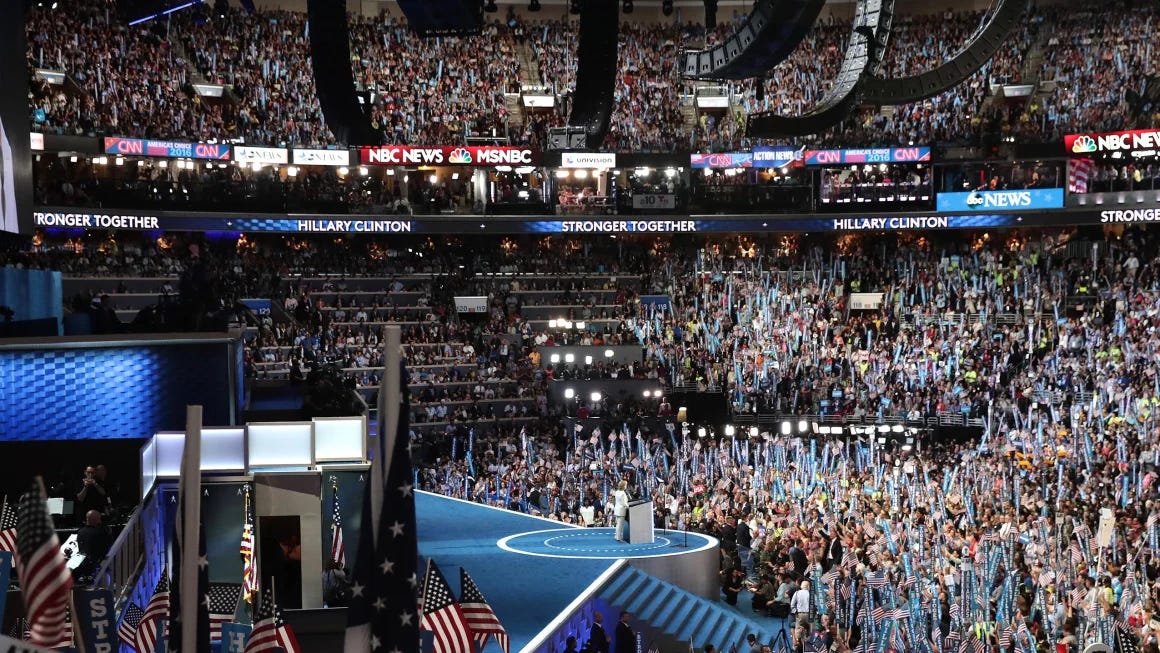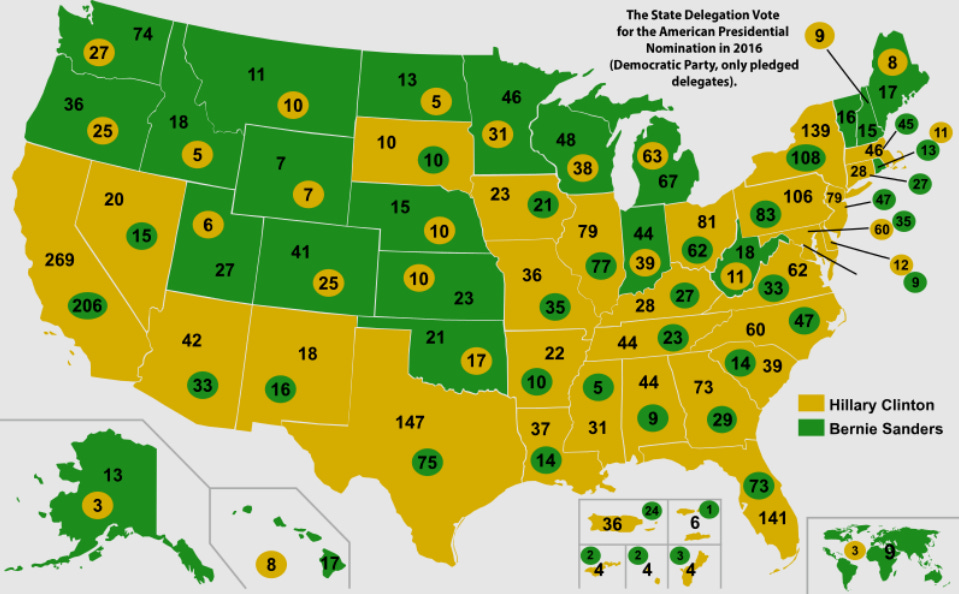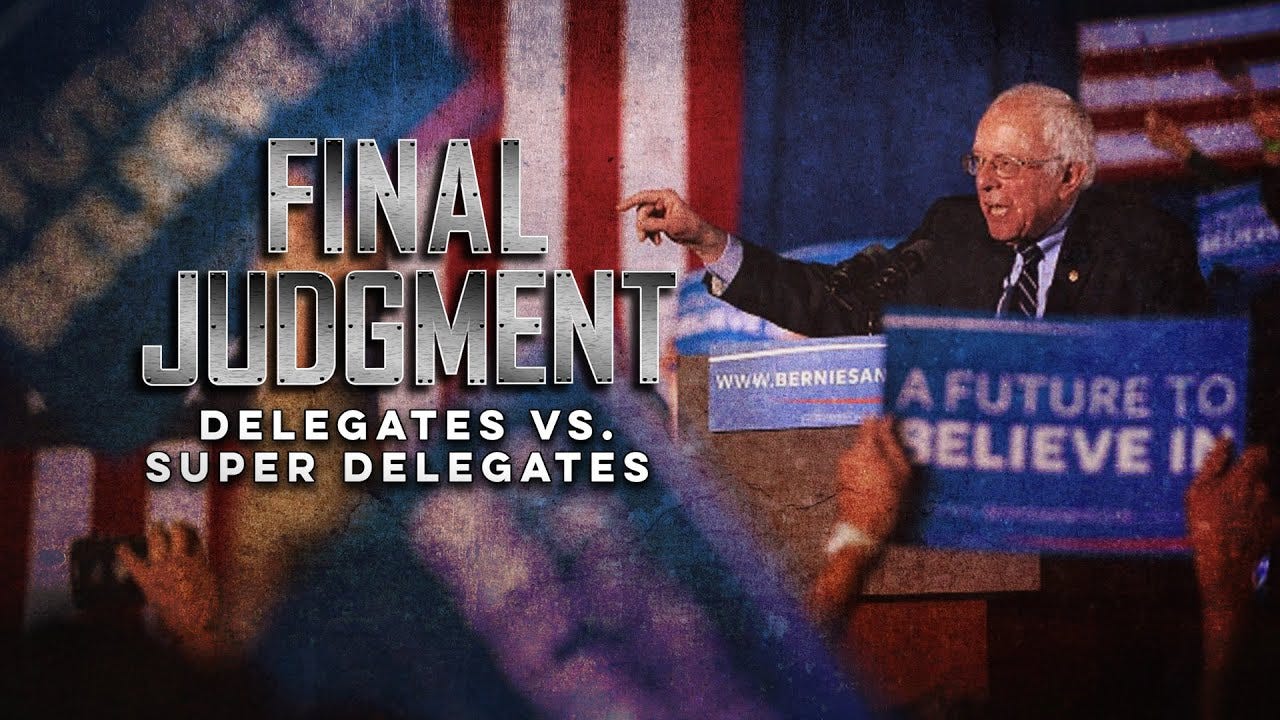What Would Happen If Biden Stepped Aside?
In the unlikely event of Biden leaving the race, Party insiders would have total control
Not that it’s likely to happen, but recent events have set minds to wondering: What would actually happen if Biden were to step aside or be somehow unable to run?
To set the stage, there are two scenarios in play. First, what if he stepped aside before the Convention? And, what if he stepped aside after it?
If Biden Drops Out Before the Convention
If Biden were to remove himself from the race, the answer to what would happen is already before us. Just examine the 2016 primary race between Bernie Sanders and Hillary Clinton, and consider the role of superdelegates.
Sanders v. Clinton in 2016
This is a map of primary states won by the two candidates based on the popular vote, Sanders states in green and Clinton states in yellow. The map shows the pledged delegate allocations. (Pledged delegates are required to vote at the Convention for the candidate who won in their voting district.)
And this is a map showing primary states actually won based on total delegates, pledged plus unpledged, the so-called superdelegates. In 2016 superdelegates could vote as they chose, even on the first ballot.
Consider a state like Michigan, where Sanders won the popular vote. The pledged delegate allocation was 67-63 Sanders. But with superdelegate preferences added in, Clinton won the state — it was reported as such on the national news — and the delegate distribution changed to 75-67 Clinton. Several states went from the Sanders column to the Clinton column in this way.
But worse, consider states won by Clinton in the popular vote, Iowa, for example. The pledged delegate count was 23-21 Clinton. With superdelegates added in, the count went to 29-21 Clinton. In Connecticut, 28-27 Clinton became 43-27 Clinton. The differences are most striking in states like California and New York, with their large delegate totals.
In all, with a total of 712 superdelegates available, Clinton started the race with an opening lead of 572-42. In the end, without her superdelegates, Clinton would not have won on the first ballot, even with the skewed reporting that served to depress the Sanders vote.
The 2016 Convention would have been brokered. As Lee Fang points out (see link below), in the 1968 convention Hubert Humphrey won without winning a single Democratic primary — and lost to Nixon.
Side Note: Sanders Would Have Won in 2016
Just an aside. I’ve often written that had Sanders won the Democratic nomination, he’d have beaten Trump handily in the general election.
There are many arguments for this, including the fact that in many “open” primaries, where a voter could choose either a Democratic or a Republican ballot, Sanders beat Trump in most of them.
For example, in the open same-day primary on March 8 in Michigan, these are the popular vote totals:
Sanders: 595,222
Trump: 483,751
The story is much the same in most of the open primaries.
But a second argument comes from the states won by Clinton in the 2016 primary. Here’s the map by state:
Clinton beat Sanders in states where Republicans were strongest — the South and Southwest — and in states where no Democrat would lose a general election — California, New York.
In Pennsylvania — a closed, same-day primary state which Clinton narrowly lost to Trump 48-47% — the top Republican vote-getters garnered a bit over 1.5 million votes. Clinton and Sanders together received 1.65 million votes. If you add just Wisconsin, Michigan and Pennsylvania, which Clinton lost to Trump but where Sanders was strong, to the Democratic electoral vote total, Sanders is over the top. This is before considering states like Arizona and Florida, where Trump only narrowly won, 48-47%.
This thought is borne out by logic. After all, Trump ran the Sanders campaign in the general election. That strategy would have failed against Sanders himself. A lot of Trump voters would have chosen Sanders instead, as shown by the open primary results.
But that’s neither here nor there, as people sometimes say. Trump beat Clinton in 2016 in the only arena that counts, the Electoral College.
And here we are.
A Biden Pre-Convention Withdrawal
The rules for superdelegates have changed a little since 2016. They’re now not allowed to vote on the first ballot. In this case, though, that wouldn’t matter. Since the Democratic leaders chose not to hold a real primary, almost no one but Biden will enter with a delegate count. Without Biden to vote for, the convention would be brokered from the start, and anyone could win — so long as they had superdelegate support.
Who are the Party’s superdelegates? The bulk are DNC members while the rest are governors, senators, representatives and “distinguished party leaders.” Dozens are lobbyists and the like.
The bottom line: Superdelegates exist to put an Establishment thumb on the Party electoral scales. In a brokered 2024 Convention, they will do that again.
If Biden Drops Out After the Convention
If Biden drops out after the Convention, the voters would have no say at all. According to Lee Fang in a paid post, superdelegates would “maintain direct control of the process if Biden were to step down after the convention.”
Following Biden’s election in 2020, the president, as the de-facto leader of the Democratic Party, appointed former corporate lobbyist Jaime Harrison as DNC chairman. Harrison used his role to bring more business representatives into superdelegate positions and voted down proposals to limit the influence of special interests within the party.
Rather than limit the influence of lobbyists, the DNC doubled down. Harrison’s appointments DNC members include Lacy Johnson, who leads the lobbying practice at Taft’s Public Affairs Strategies Group, a firm that assists Koch Industries and a trade group for oil refineries with government outreach; Marcus Mason, a lobbyist who represents Google and Navient; and Nicole Isaac, a former Meta and Google official, now leads Cisco's global lobbying operations.
The Harrison-led DNC has blocked efforts to curb corporate influence in the party. The Rules and Bylaws Committee has instead concentrated more power to a select group of DNC insiders. The committee is also responsible for the decision to remove Iowa and make South Carolina the first official primary election.
This is an ugly bunch of people:
[I]f Biden were to exit the race post-convention, the decision would rest solely with a select group of DNC insiders. According to the DNC charter, this process would be governed by rules established by the DNC Rules and Bylaws Committee [which] notably comprises establishment figures, including lobbyists representing corporate interests. […]
Minyon Moore, co-chair of the DNC Rules and Bylaws Committee, is an influential lobbyist who previously served as an aide to Bill and Hillary Clinton and now works at Dewey Square Group. DSG has worked for a variety of corporate interests. Lyft tapped DSG to fight proposals in California and Massachusetts that would force the company to provide benefits and minimum wages to its drivers. […]James Roosevelt, Jr., the grandson of President Franklin D. Roosevelt, is the other co-chair of the DNC Rules and Bylaws Committee. He is a registered lobbyist with the law firm Verrill in Boston, Massachusetts, where he guides various healthcare interests. He previously served as the chief executive of the Tufts Health Plan, a health insurance company that is now part of Point32Health. […]
The DNC Rules and Bylaws Committee […] includes New Jersey lobbyist Tonio Burgos, who represents UnitedHealth and AIG, among other clients; Tonya Williams, a longtime D.C. lobbyist who now runs a firm called Blue House Advisors; and Gary Locke, President Obama’s ambassador to China who now works at a U.S.-China law firm.
As Politico notes in an article on the same subject, “The truth is that a backup strategy can only be deployed if Biden voluntarily steps aside — or is physically unable to stand for nomination.”
And here we are.










They could let their base pick a candidate, or they could just continue to Whig themselves into oblivion. I'm OK with the latter, will shed no tears for this party that bears no resemblance to an actual working political party.
If corporations can issue preferred stock, then of course a corporation, the Democratic Party, cannot resist creating 'super delegates'. How do Democratic National Committee members align this feature with the mantra of "preserving our democracy"?
The answer to my question is immaterial. They do what they do and expect us to genuflect. Biden's nomination was no more valid than former Secretary of State Clinton's. Remember the Eve of Super Tuesday massacre? All but two Democratic primary campaigns ended right then and there.
I implore all that may write in a vote for President, to do so. Let's stop giving legitimacy to these sham elections.